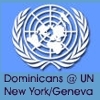

| BRIEFING - January 26, 2011 | To learn more about the Millenium Development Goals click on the graphic
| ||
Social development: Making people, not profits, a priority
From Feb. 9-18, the UN Commission for Social Development will meet here in New York, to address the priority theme of poverty eradication. In this Briefing, I would like to provide an overview of the commission, and in subsequent briefings report on the proceedings of the commission, as well as the involvement of the NGO community in its advocacy work with governments around the priority theme. The Commission for Social Development is one of the functional committees within ECOSOC, the Economic and Social Council of the United Nations. ECOSOC was established under the UN Charter as the principal organ to coordinate economic, social and other related work of UN specialized agencies, functional commissions and regional commissions. ECOSOC’s mandate in the UN Charter is as follows:
The Commission for Social Development consists of 46 members elected by ECOSOC. Since the convening of the World Summit for Social Development in Copenhagen in 1995, the Commission has been the key UN body in charge of the follow-up and implementation of the Copenhagen Declaration and Programme of Action. Each year since 1995, the Commission has taken up key social development themes as part of its follow-up to the outcome of the Copenhagen Summit. The three main themes of this Summit were poverty eradication, full and decent employment and social integration. The Copenhagen Declaration on Social Development highlights 10 commitments made by world leaders to address these major themes:
This year, the Commission for Social Development will address the theme of poverty eradication. Themes are addressed in a two-year cycle: the first year an opportunity to evaluate progress on the priority theme, and the second year a consideration of policy recommendations. The theme is particularly significant in that this past September, the review summit on the Millennium Development Goals indicated that despite some progress, there is still a great deal of work to be done in poverty eradication, particularly in Africa. Needless to say, the NGO community is mobilized around this issue, as many of our members live and work in some the most impoverished parts of our world. Our own Dominican brothers and sisters are found in Cameroon, Central African Republic, Democratic Republic of Congo, Ghana, Kenya, Nigeria… just to name a few of these places for which poverty eradication is literally a matter of life and death. In the Department of Economic and Social Affairs’ publication entitled, “Re-Thinking Poverty: Report on the World Social Situation 2010,” the authors state:
The authors go one to state that the current model of development, that equates progress with economic growth alone, is simply not working for the vast majority of people living in poverty. Poverty is a multi-dimensional phenomenon, and one that must be dealt with by placing people and their needs at the center of development, rather than profit. Clearly, this is not a popular notion among the developed nations, including our own, where profit is what the economy is all about. Advocating for a people-centered model of development is the role of the NGO representatives during the proceedings of the commission. More next time…
|
Dominican Leadership Conference
Building relationships and collaborating in the mission of preaching the Gospel
29000 West Eleven Mile Road
Farmington Hills MI 48336
248-536-3234 Contact: Executive Director
